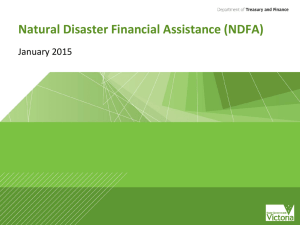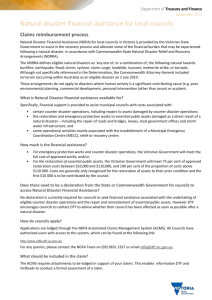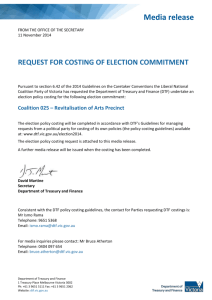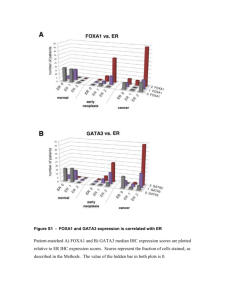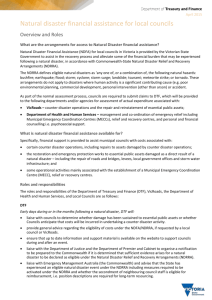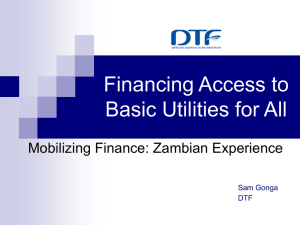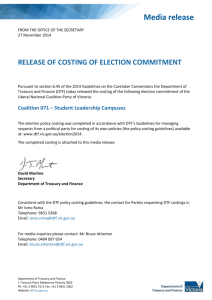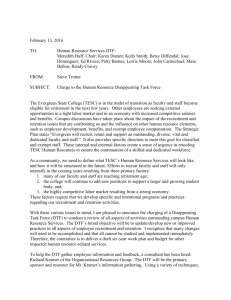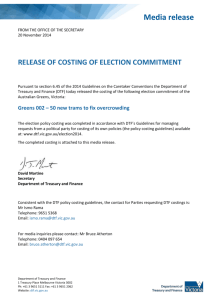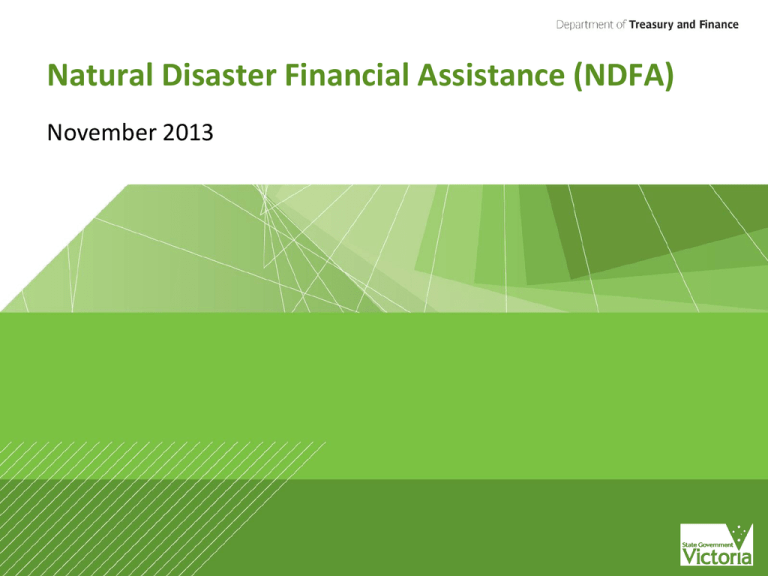
Natural Disaster Financial Assistance (NDFA)
November 2013
Overview of the NDFA
• Assists in the recovery process & alleviates some of the
financial burden experienced following a natural
disaster including assistance to:
- municipal councils & Catchment Management Authorities
(CMAs);
- Individuals & households (personal hardship grants);&
- Primary producers, small businesses & not-for-profit
organisations (Concessional loans & Clean up & Restoration
Grants)
• Mirrors the joint State-Commonwealth Natural
Disaster Relief & Recovery Arrangements (NDRRA).
Eligible natural disasters
• Assistance is available for the following types of
events:
- Bushfire, earthquake, flood, storm, cyclone, storm surge,
landslide, tsunami, meteorite strike or tornado
- Terrorism an additional inclusion in July 2010
• Non-natural disasters not eligible, including:
- Drought, frost, heatwave, epidemic, or events where human
activity is a significant contributing cause (for example, poor
environmental planning, commercial development, personal
intervention (other than arson), or accident)
Applying for financial assistance
• Councils can apply for assistance through:
- Claims (actual expenditure incurred); or
- Advance Payment requests
• The DTF website provides
- A flowchart on the Claims & Advance Payment processes
http://www.dtf.vic.gov.au/Publications/Victoria-Economypublications/Claims-and-advance-payment-process; and
- Claim form
http://www.dtf.vic.gov.au/Publications/Victoria-Economypublications/Municipal-claims-form
Claims Process
• Councils required to submit Claims for actual eligible
expenditure regularly to DTF with a copy to VicRoads
i.e. at least quarterly
• Expenditure is formally assessed by VicRoads
• Process generally takes 6 – 8 weeks subject to
complexity of claim
Claims process cont.
• All restoration works required to be completed within
the allowable time period of 2 years from the end of
the financial year in which the natural disaster
occurred
- i.e. the deadline for February/March & June 2012 flood repairs is
30 June 2014
• Allowable time period deadlines for NDRRA notified
events are provided at the following link:
http://www.dtf.vic.gov.au/Victorias-Economy/Natural-disasterfinancial-assistance/Allowable-time-period
• In exceptional circumstances, an extension may be
successful however, becoming harder to argue
Advance Payment process
• Where financial hardship can be demonstrated, an
advance payment may be requested to assist with cash
flow in commencing repair or restoration works.
• Requests should be addressed to Jillian Wyatt, DTF,
Level 9, 1 Macarthur Street, Melbourne 3002 & include
-
the full amount of the advance requested;
total estimated damage;
expected date works will be completed;
event & outline of the natural disaster; &
the balance remaining of previous advance (if
applicable).
Advance Payment process cont.
• Advance payment requests subject to internal DTF
approval & DTF Secretary sign-off
• Councils will receive confirmation of advance
payments approved
• Justification Claims (offsetting against the advance) are
required to be submitted to DTF on a regular basis –
with a copy to VicRoads to speed up the process
• VicRoads will then undertake formal assessment of
expenditure as per the normal claims process
Eligible costs which Councils can claim
• Certain counter disaster operations, including repairs
to facilities damaged by counter disaster operations
• The restoration & emergency protection works to
essential public assets damaged as a direct result of a
natural disaster. Restoration is only to pre-existing
condition using current engineering & design standards
• Some additional operational costs mainly associated
with the establishment of a:
- Municipal Emergency Coordination Centre (MECC);
- Relief centre; and/or
- Recovery centre
Restoration of Essential Public Assets
• Definition under the NDRRA recently narrowed to:
- An integral & necessary part of the State’s infrastructure
associated with health, education, transport, justice or welfare
• Eligible assets include:
- Road & bridge infrastructure, footpaths, levees, local government
offices & storm water infrastructure
• Sporting & community facilities, religious
establishments & memorials now generally excluded
• Assets need to be owned by the council
• Eligibility issues should be directed to Donna Kennedy,
DTF, in the first instance
Notification of Events
• Councils should advise Donna Kennedy, DTF, of:
- damage to essential public assets or that they are
undertaking counter disaster activities or establishing a
MECC, Relief or Recovery Centre, as soon as possible
following a natural disaster event
- Any revisions to damage estimates including project
management costs
Ineligible costs
Include:
• Normal maintenance & administration costs including
salaries, day labour costs & other ongoing
administrative type expenditure which would have
been incurred even if the natural disaster had not
occurred
• Costs associated with restoring natural vegetation,
natural banks, streams, rivers, beaches & undeveloped
land
• Costs incurred in mitigating, restoring or replacing an
asset to a more disaster resilient level or higher level of
service (unless otherwise agreed)
Lessons Learned over the past three years!
• Engage with DTF & local VicRoads officers as soon as
possible after an event
• Communicate with DTF & local VicRoads officers
regularly on eligibility issues, i.e. alerting DTF when an
advance payment is needed urgently to assist council
with cash flow
• Organise your procurement process
• Develop clear systems to assist with the collection of
eligible costs
More Lessons Learned
• Prioritise repair works to meet the allowable time
period i.e. hire additional external project
manager/engineers & establishing a Flood Repair
Office
• Clear communication between the MERO, Engineering
and Finance teams, and CEO
• Seek advice from other experienced Councils
• Submit regular claims to DTF at least quarterly
NDFA/NDRRA – future expectations
• More reporting to Commonwealth including
evidence of public acknowledgement
• NDRRA Review of Insurance Arrangements –
provision of essential public asset registers and
detail around insurance arrangements to DTF by
Councils (December 2013/January 2014)
Further information
• Website
http://www.dtf.vic.gov.au/Victorias-Economy/Natural-disasterfinancial-assistance
• Email address:
NDFA@dtf.vic.gov.au
Copyright (C) 2013. State of Victoria. All rights reserved.
The information contained in this presentation is provided by the
State of Victoria for information purposes only. While the State
of Victoria has made every effort to ensure the information
contained in this presentation is free from error, the State of
Victoria does not warrant or represent its accuracy, adequacy or
completeness. All information detailed in this presentation is
subject to change without notice.

